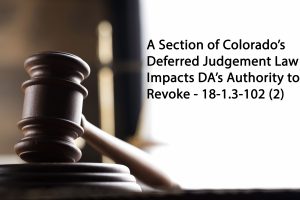Section of Colorado’s Deferred Judgement Law Impacts DA’s Authority to Revoke 18-1.3-102

H. Michael Steinberg Colorado Criminal Defense Lawyer
Introduction – Looking for Laws to Defend Against Injustice
While I have written about Colorado’s Deferred Judgement laws before, it is a critical part of Colorado criminal law the impact of the “loss” of a deferred judgement can have long term consequences to the person involved.
This article reviews a little-used section of the law that impacts a Colorado prosecutor’s power to revoke a Colorado deferred judgement agreement.
A revocation of a deferred judgement can have a devastating impact on a person’s life by converting the charge that was “deferred” into a permanent conviction.
The Colorado Deferred Judgement
A deferred judgment is an agreement, a contract between the Prosecutor’s office, the Defendant, and the Court. It allows a Judge to withhold a “judgment” (a conviction) for a crime. A conviction is a finding that the defendant is guilty.
A deferred judgement allows the Court to place the defendant on probation for an agreed upon period of time. Usually, there are several conditions placed on the successful completion of the deferred judgement “contract.”
Conditions, such as public service hours, domestic violence treatment, alcohol and/or drug-related treatment, etc. are good examples. The defendant is also ordered not to have any additional law violations, other than minor traffic offenses (speeding), during the period of the “deferred” (what lawyers call a “DJ.)”
The Deferred Judgement “Revocation Hearing”
If the defendant is found, after a hearing to revoke the deferred judgement, that there has been a violation, either a technical violation of one of the conditions of probation or the commission of a new crime, the deferred judgment is usually revoked and the defendant is re-sentenced.
On the other hand, if a defendant successfully completes the DJ the plea of guilty is withdrawn and the case is dismissed. The record of the case can then usually be sealed.
This is the legal equivalent of a not guilty verdict by a jury following a trial.
The Power of the Colorado District Attorney to Revoke A Deferred Judgement is Almost Limitless
The Colorado District Attorney’s power to seek and to obtain a revocation of a deferred judgement where there is evidence of a violation is almost limitless. The DA can, if it is established that there was a breach of the “contract” that is the deferred judgement, agree to terminate the DJ but not revoke it, add new conditions – (or reinstate and maintain the original conditions), extend the length of the DJ, or just revoke the DJ and seek any of the original sentencing options that are available for the crime to which the defendant pleaded guilty.
The Hitch – A Little Known Section of the Colorado Deferred Judgement Law
Buried in Section 2 of the Colorado Deferred Judgement law 18-1.3-102, is the following lengthy and difficult paragraph.
I have broken out for easier reading and understanding – I have bolded the key sentences addressed in this article:
(2)…The stipulation shall specifically provide that, upon a breach by the defendant of any condition regulating the conduct of the defendant, the court shall enter judgment and impose sentence upon the guilty plea; except that,
if the offense is a violation of article 18 of this title, the court may accept an admission or find a violation of the stipulation without entering judgment and imposing sentence if the court first makes findings of fact on the record stating the entry of judgment and sentencing would not be consistent with the purposes of sentencing, that the defendant would be better served by continuing the deferred judgment period, and that public safety would not be jeopardized by the continuation of the deferred judgment.
If the court makes those findings and continues the deferred judgment over the objection of the prosecution, the court shall also impose additional and immediate sanctions upon the defendant to address the violation, to include, but not be limited to,
the imposition of further terms and conditions that will enhance the likelihood of the defendant’s success, respond to the defendant’s noncompliance, and promote further individual accountability,
including extending the time period of the deferred judgment for up to two additional years or
incarceration in the county jail for a period not to exceed ninety days consistent with the provisions of section 18-1.3-202 (1), or both.
Article 18, referred to in the law above, is a section of the Colorado Criminal Laws that addresses the prosecution of drug crimes.
If the deferred judgment is to a drug crime charged under 18-18-101 and the laws contained therein, this escape hatch section of the deferred judgement law would apply.
Even if the deferred is not to a drug crime there is an argument to be made that if the condition allegedly violated in the deferred judgement is based on the use of drugs, there is at least morally persuasive authority that the deferred judgement should not be revoked.
The argument is just that, however, it can be used to try to persuade the prosecutor to not revoke a deferred to a non-drug crime. The statute only applies to DJ’s to Colorado drug crimes charged under Title 18, Article 18 Colorado’s Uniform Controlled Substances Act of 2013.
A New Way of Looking at Drug-Related Violations of Colorado Deferred Judgements
This section was a part of a “movement” in 2013 to view drug-related cases differently than in the past. If the alleged violation of the deferred judgement to a Colorado controlled substances crime this section gives authority to the Judge to prevent the revocation of the deferred judgement and imposition of a conviction that may be sought by the District Attorney – OVER the DA’s objection.
In 2013 A commission – called the Colorado Drug Policy Task Force of the Colorado General Assembly found the following worthy goal to:
seek to improve public safety, reduce recidivism, and promote substance abuse treatment by implementing a system of evidence-based sentencing practices and community-based interventions that…will combine accountability, risk and needs assessments, criminal penalties, and appropriate treatment for individuals who are addicted to substances and convicted of criminal offenses.
The law instructs the Colorado courts, before sentencing a person to prison for example to:
- take into consideration the facts of the case,
- the defendant’s willingness to participate in treatment,
- finding that all other sanctions have been tried and failed,
and that other sanctions are unlikely to work, - and that other sanctions present an unacceptable risk to public safety (before sentencing a person to prison).
The approach is to try to distinguish between different kinds of drug abusers:
- a defendant who is an illegal drug user but is not addicted or involved in other criminal activity;
- a defendant who is addicted but is not otherwise engaged in other criminal activity;
- a defendant who is addicted and engaged in nonviolent crime to support their addiction;
- a defendant who is addicted and engaged in violent crime; and
- a defendant who is engaged in drug trafficking or manufacture for profit who is not addicted to illegal drugs.
Inserted into this major piece of intelligent legislation was this legislative goal:
Meeting the public safety and public health needs of our communities demands a collaborative effort involving primary healthcare, behavioral health, criminal justice, and social service systems;
Here is a link to the entire section of Colorado’s Deferred Judgement Law
I hope this article provides a useful tool to defending a revocation of a deferred judgement where the use of drugs is the issue and where the defendant needs help not punishment
Never stop fighting – never stop believing in yourself and your right to due process of law.
 ABOUT THE AUTHOR: H. Michael Steinberg – Email The Author at hmsteinberg@hotmail.com – A Denver Colorado Criminal Defense Lawyer – or call his office at 303-627-7777 during business hours – or call his cell if you cannot wait and need his immediate assistance – 720-220-2277. Attorney H. Michael Steinberg is passionate about criminal defense. His extensive knowledge of Colorado Criminal Law and his 42 plus years of experience in the courtrooms of Colorado may give him the edge you need to properly defend your case.
ABOUT THE AUTHOR: H. Michael Steinberg – Email The Author at hmsteinberg@hotmail.com – A Denver Colorado Criminal Defense Lawyer – or call his office at 303-627-7777 during business hours – or call his cell if you cannot wait and need his immediate assistance – 720-220-2277. Attorney H. Michael Steinberg is passionate about criminal defense. His extensive knowledge of Colorado Criminal Law and his 42 plus years of experience in the courtrooms of Colorado may give him the edge you need to properly defend your case.
 Colorado Criminal Lawyer Blog
Colorado Criminal Lawyer Blog

